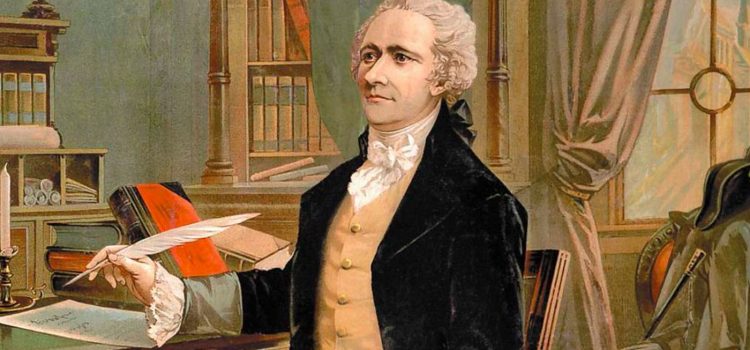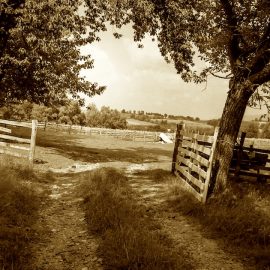

This article is an excerpt from the Shortform book guide to "Alexander Hamilton" by Ron Chernow. Shortform has the world's best summaries and analyses of books you should be reading.
Like this article? Sign up for a free trial here.
Why did Aaron Burr challenge Alexander Hamilton to a duel? How did Hamilton die?
Ron Chernow’s biography Alexander Hamilton details the death and legacy of the political figure, including Aaron Burr’s involvement in his final moments. Hamilton’s death added to the end of Federalism.
Keep reading to learn more about the events of Hamilton’s death and how people remembered him.
Hamilton’s Death and Legacy
How did Hamilton die? Hamilton died after being shot in a duel with politician Aaron Burr, which Chernow argues would be his most famous misstep, overshadowing accounts of his life up until the modern day. This is partly due to the sensationalism of the crime, as both Hamilton and Burr were famous public figures, dueling had recently been outlawed in New York, and Hamilton was relatively young (47) at the time of his death.
Duel With Burr
Burr was a frequent target of Hamilton’s criticism, as he switched party allegiances throughout his career. Hamilton was even harsher toward Burr than toward leading Republicans, describing him as a morally bankrupt opportunist who behaved in whatever way was politically convenient for him. Burr challenged Hamilton to a duel over the personal nature of the insults and his belief that Hamilton had cost him two critical elections—though Chernow suggests that his loss of the presidency in 1800 and the governorship of New York in 1804 had more to do with Burr’s general unpopularity.
(Shortform note: While he finished his term as Jefferson’s Vice President, Burr never held political office again after the duel, and the remainder of his life was beset by scandal. For example, in 1807 he was accused of treason for supposedly attempting to found his own country in the American Southwest and subsequently fled to Europe. Today, Burr is known primarily as Hamilton’s killer.)
The circumstances of Hamilton’s death have been repeatedly questioned by historians, with attendees giving different accounts of who fired first. Chernow agrees with the theory that Hamilton deliberately withheld his fire, as he had written a statement before the duel declaring his intention to “hold his shot” out of a moral objection to killing and desire to resolve the conflict without violence. This was considerably riskier than arranging an apology in advance, but Hamilton’s friends failed to convince him to either forgo the duel or make a genuine attempt to defend himself. The result was that Hamilton was fatally shot by Burr, dying at home the next day.
(Shortform note: Dueling, in which one person challenges another to a fight to the death in the name of honor, dates back to medieval Europe. Typically, both participants must use the same weapon—often swords or pistols—and follow strict rules of conduct regarding where, when, and how they can fight. Though dueling was extremely common in 18th and 19th century America, it rarely resulted in any deaths. The practice died out by the 1870s, though it remains a popular trope in American Western films.)
Hamilton’s Memory
Hamilton was mourned by all of New York, and Burr would be remembered by history as a villainous murderer. Even so, Chernow argues that the many controversies of Hamilton’s life continued to haunt his legacy after his death. While his widow, Eliza Schuyler Hamilton, attempted to rehabilitate his image by commissioning a lengthy biography by their son, historians have often pulled from Adams’s and Jefferson’s many attacks on Hamilton to depict him as an indiscreet and manipulative politician whose relevance ended with that of the Federalist party.
(Shortform note: While Hamilton was generally treated as a minor character in revolutionary history prior to the success of the 2015 musical, he appears as an outright villain in such works as Gore Vidal’s 1973 novel Burr, the 2008 HBO miniseries John Adams, and Dumas Malone’s six-volume biography Jefferson and His Time, in which Malone accuses Hamilton of having “lusted for personal as well as national power.”)
By recounting Hamilton’s life, Chernow hopes to prove that these framings are both inaccurate and fail to recognize the ways in which the modern US is the realization of Hamilton’s vision, far more so than that of Jefferson or many of the other Founding Fathers. The US of today has a strong central government and an urban, capitalist economy, with the New York banks and stock exchanges founded in Hamilton’s day (and with his encouragement) as the country’s financial center. Chernow believes that even with Hamilton’s personal struggles, and though he was never president, Hamilton left an indelible stamp on the very structure of the US.
(Shortform note: Chernow’s argument is arguably an oversimplification, since the division between state and federal powers and the future of the US economy would remain controversial issues for much of the 19th century—the Civil War‘s battle over slavery was followed by the Reconstruction era’s attempt to reassert federal power and then by the withdrawal of that power in the Compromise of 1877. The US has not followed a straight line of urban and federal development from Hamilton today, but continued to struggle over its future.)

———End of Preview———
Like what you just read? Read the rest of the world's best book summary and analysis of Ron Chernow's "Alexander Hamilton" at Shortform.
Here's what you'll find in our full Alexander Hamilton summary:
- The biography of Alexander Hamilton that was adapted into the Broadway musical
- The life and influence of the overlooked Founding Father
- How Hamilton's life ended in scandal and a fatal duel






